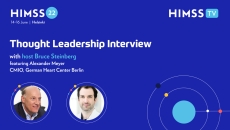Artificial Intelligence
HIMSS22 Europe
"You have to get a hold of the data and understand the business process," explains Atif Chaughtai, Red Hat's global healthcare market leader.
Interoperability isn't enough. Providers need to quickly access the most relevant patient information at the point of care. Bill Hayes, MD, chief medical officer at CPSI, talks about how machine learning he calls "cognitive logic" could help.
HIMSS22 Europe
The chief medical information officer at German Heart Center Berlin discusses how artificial intelligence and interoperability are enabling leading-edge medical care for patients.
Ramakant Vempati, Wysa cofounder and president, discusses how the startup tests its AI-backed chatbot to monitor safety and quality.
The New York City medical group health system physical therapy program saw 70% of patients adhere to care plans in comparison with the standard 5% in-facility during the height of the pandemic.
The collaboration, which will see the health systems working with deidentified data for algorithm development and validation, will focus on patient outcomes and aim toward "personalized, predictive and proactive medicine."
"Neurocognitive health interventions must be multipronged and personal, which necessitates the use of digital tools to adequately equip health systems to meet this growing need," one expert says.
How does Availity use AI and ML to help providers and payers streamline approvals, referrals and claims management? Mark Martin, its vice president of product management, explains.
The latest clearance is for an algorithm that characterizes how much atrial fibrillation a patient is experiencing over time.
As artificial intelligence and machine learning are deployed more widely and consequentially across healthcare and elsewhere, "it is vital that we address safety, security and equity concerns."









